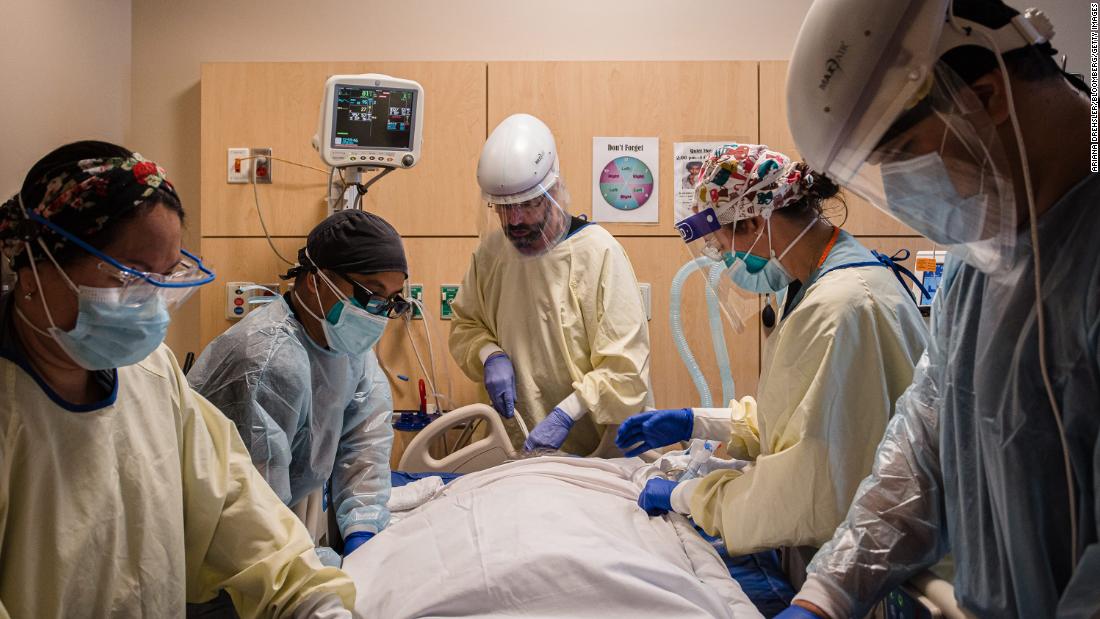“Please listen to me clearly: at this level of cases with the spread of variants, we can completely lose the hard-won ground,” said Dr. Rochelle Walensky, director of the United States Centers for Disease Control and Prevention.
“Likewise, the most recent average of deaths in seven days has also increased by more than 2% … to almost 2,000 deaths per day.”
“I’m really concerned about reports that more states are reversing the exact public health measures that we recommend to protect people at Covid-19,” she said.
“Please remain firm in your conviction. Keep wearing your tight-fitting mask and taking the other public health prevention actions that we know will work, ”added Walensky.
“It is very important that we remain vigilant and consistently take all the mitigation measures that we know will work to prevent the spread of Covid-19 while working towards mass vaccination.”
A third vaccine will help with mass vaccination
The good news this week: the Johnson & Johnson single-dose vaccine will begin to be administered.
“There is a kind of new urgency to this,” said Dr. Eric Rubin, a professor at the Harvard TH Chan School of Public Health.
“As there are new viral variants emerging now, with some chance that some of them may eventually become resistant to the protection provided by vaccines, it is really important to get them out quickly.”
About 3.9 million doses of the J&J vaccine will be distributed to states, tribes, territories, pharmacies and community health centers, a senior Biden government official said Sunday night.
“These doses of J&J will be delivered as early as Tuesday morning.”
As a single-dose vaccine, “people don’t need to return for a second dose to be protected,” said Walensky.
“In addition, this vaccine does not need to be kept in a freezer and can be stored at refrigerated temperatures. Therefore, it is easy to transport and store and allows for greater availability in most community environments and mobile locations as supply increases.”
The other two vaccines distributed – one from Pfizer-BioNTech and the other from Moderna – have efficacy rates of around 95%, with even greater protection against severe forms of the disease.
The Johnson & Johnson vaccine showed a 72% efficacy rate against mild to severe / critical illness among study participants in the United States. It is most effective against severe forms of disease, with about 85% protection.
Health experts say that Americans should not be discouraged by the slightly lower numbers of J&J. His vaccine was tested later than the other two vaccines, when infections were already on the rise and new variant strains were spreading more widely.
Don’t be too picky about which vaccine you are going to get
“Think about the other vaccines we received. If we are going to get the flu shot, I don’t think anyone is asking the brand of the flu shot (or) which company makes it.”
Furthermore, “in the immediate future, people will have no choice when supply is a limiting factor,” she said.
“At the moment, the key is to get some kind of immunity. Get any vaccine that is available to you. You can always get another vaccine or booster shot later, when the supply is not the problem.”
New variants continue to spread
These counts are probably much lower than the actual number of people infected with variants. The numbers represent only the variant cases found through genomic sequencing, said the CDC.
Can vaccines avoid the new variants?
Johnson & Johnson, Moderna and Pfizer-BioNTech are trying to ensure that their vaccines are ahead of variants.
Johnson & Johnson is working on a boost to help its Covid-19 vaccine deal with new strains of coronavirus variants, CEO Alex Gorsky said on Monday.
“While we are encouraged and confident in the current vaccine we have, you always have to prepare for the future and, frankly, for the unknown,” said Gorsky.
This injection would serve as a booster for people who have already been vaccinated and as a primary vaccine for people who have not had coronavirus and have not yet been vaccinated.
Moderna is also testing a third lower dose of its current vaccine on trial participants to see if it would protect against problematic variants.
Pfizer and BioNTech said last week that they started testing how well a third dose of their authorized vaccine compares to new variants.
Many more need vaccine before herd immunity
About 7.5% of Americans were fully vaccinated with both doses.
Vaccines will be tested on children
“We will conduct a number of immunogenicity and safety studies in 17-year-olds on neonates,” Douoguih told a CDC advisory committee on Sunday.
“The study on adolescents, we hope, will begin next week. We are also looking at a study on pregnant women in the second and third trimesters in late March, early April,” said Douoguih.
Johnson & Johnson also plans to start the study on immunocompromised people in the third quarter of this year, said Douoguih.
The FDA’s emergency use authorization for the Johnson & Johnson vaccine is currently for use in adults 18 years and older.
CNN’s Jen Christensen, John Bonifield, Jason Hoffman, Michael Nedelman and Maggie Fox contributed to this report.
